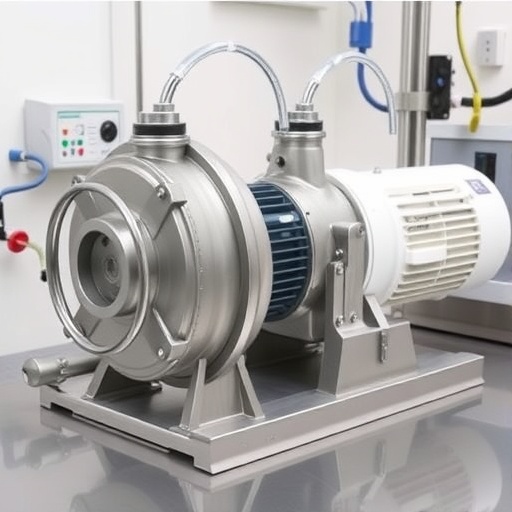In recent years, the field of mechanical circulatory support has undergone a remarkable transformation, largely driven by advancements in extracorporeal centrifugal pumps. These devices have emerged as pivotal tools in the management of severe heart failure, providing much-needed support to patients who are unable to maintain adequate circulation. The mechanical operation of these pumps introduces a new era in cardiac assistance, underscoring the importance of innovation in medical technology. Their impact on patient outcomes cannot be overstated, as they bridge the gap for many individuals awaiting heart transplants or recovering from cardiac surgery.
Extracorporeal centrifugal pumps operate by utilizing a rotating mechanism, enabling blood to be drawn outside of the body and returned after being oxygenated and filtered. This process is fundamental in enhancing cardiac output, particularly in patients suffering from end-stage heart disease. The technical intricacies of these pumps revolve around their design and function, which involve the manipulation of fluid dynamics in order to create a steady flow that mimics the natural function of the heart. The ability to adapt to various patient needs highlights the versatility of these pumps.
Advancements in materials science have also played a critical role in improving the efficiency and safety of centrifugal pumps. New biocompatible materials have reduced the risk of thrombosis and hemolysis, common complications associated with blood contact in mechanical devices. These developments not only extend the lifespan of the pumps but also contribute to better patient outcomes through decreased incidence of adverse events. Enhanced durability allows for longer-term usage in chronic cases, providing invaluable support to those with ongoing cardiac challenges.
Moreover, the integration of telemetry and smart technology into these pumps has revolutionized the way clinicians monitor and manage patients. Real-time data transmission allows for continuous assessment of pump functionality, blood flow parameters, and patient vitals. This capability ensures timely interventions when necessary and adds an additional layer of security in patient care. Clinicians are now better equipped to make informed decisions based on immediate data, improving overall response times and patient management strategies.
The evolution of extracorporeal centrifugal pumps has not only been confined to technical enhancements but has also embraced a paradigm shift towards more compact and portable designs. Portable pumps have made it feasible for patients to maintain a sense of normalcy while receiving treatment. This development is crucial for long-term therapy, as it enables patients to participate in daily activities, significantly impacting their quality of life. The mobility afforded by these advancements represents a significant leap forward in the paradigm of cardiac care.
As we delve deeper into the mechanics of these pumps, it is essential to understand the underlying engineering principles that inform their design. The centrifugal force generated by the rotation of the impeller is what propels the blood through the device, and its efficiency is contingent on various design parameters, including pump size and rotational speed. Engineers continuously explore innovative configurations that strike the perfect balance between flow rate, pressure generation, and energy efficiency, contributing to the advancement of this life-saving technology.
In parallel with these advancements, clinical trials have been paramount in evaluating the efficacy and safety profiles of new centrifugal pump systems. Rigorous testing has paved the way for regulatory approvals, ensuring these devices meet stringent safety standards before they are used in clinical settings. The collaborative efforts between engineers, clinicians, and regulatory bodies underline the commitment to patient safety and effective treatment modalities.
The future of extracorporeal centrifugal pumps appears promising, with ongoing research aimed at miniaturizing these devices further while enhancing their capabilities. Researchers are delving into more sophisticated algorithms that enhance the responsiveness of the pumps during fluctuating hemodynamic conditions, paving the way for more intelligent devices that can autonomously adjust according to patient needs. This forward-thinking approach is essential as it aligns with the overarching goal of personalized medicine.
Patients with congenital heart defects and those undergoing complex cardiac surgeries stand to benefit immensely from these technological advancements. The modular construction of modern centrifugal pumps allows for tailored solutions, accommodating a range of physiological requirements. The ability to customize treatment such that it adheres to individual patient profiles marks a significant milestone in cardiac disease management.
A crucial component of implementing these supportive devices is the educational aspects for both patients and healthcare providers. Understanding the functionality, maintenance, and potential complications associated with mechanical circulatory supports is imperative for optimization. Well-informed patients demonstrate improved adherence to recommended care protocols, which ultimately leads to better outcomes. Educating healthcare providers on the latest advancements fosters a culture of innovation in clinical practice.
In conclusion, the progress of extracorporeal centrifugal pumps represents a significant achievement in the realm of mechanical circulatory support, marking a transformative chapter in cardiac care. The interplay of engineering excellence, material science advancements, and clinical expertise exemplifies the holistic approach that underpins this field. As researchers and engineers continue to innovate, we can anticipate even more breakthroughs that will reshape the landscape of heart failure management.
As these advancements unfold, it remains essential for the medical community to stay informed and engaged with emerging technologies. The future of cardiac treatment is bright as we leverage these tools to save lives and improve outcomes for patients across the globe. All stakeholders involved in patient care must commit to an adaptive mindset, embracing the continuous evolution of technology to meet the ever-changing needs of patients.
Subject of Research: Mechanical circulatory support through extracorporeal centrifugal pumps.
Article Title: Progress of extracorporeal centrifugal pumps for mechanical circulatory supports.
Article References: Tsukiya, T. Progress of extracorporeal centrifugal pumps for mechanical circulatory supports. J Artif Organs 28, 281–287 (2025). https://doi.org/10.1007/s10047-024-01492-6
Image Credits: AI Generated
DOI: https://doi.org/10.1007/s10047-024-01492-6
Keywords: Mechanical circulatory support, centrifugal pumps, heart failure, biocompatibility, telemetry, patient monitoring, portable pumps.




